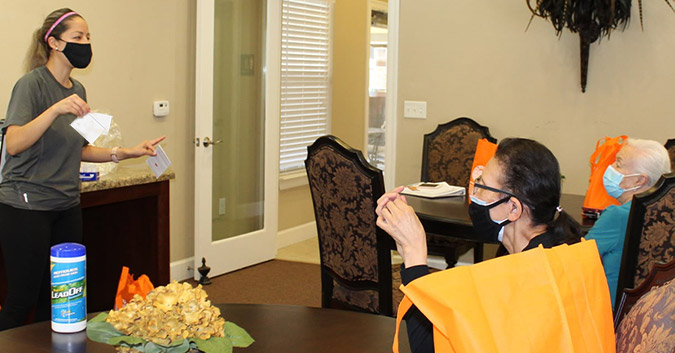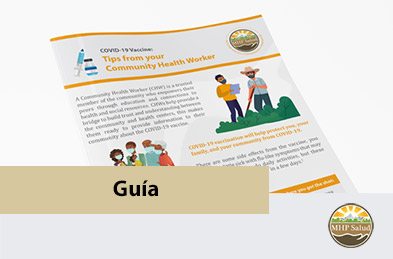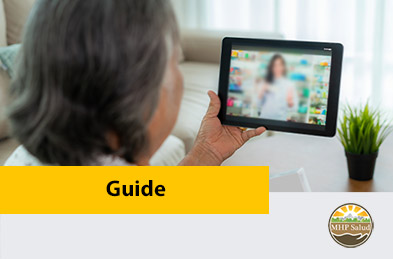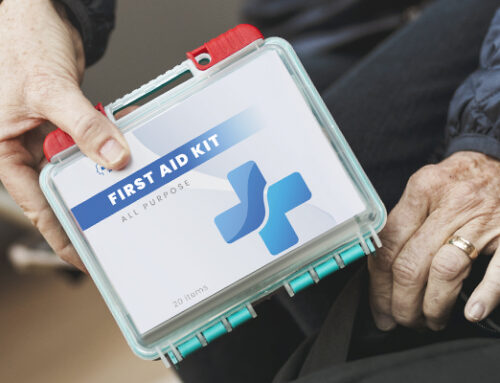Vaccine Hesitancy and Older Hispanic Adults: Truths and Myths about the COVID-19 Vaccine
Published April 2021 | Read this article in Spanish.
* Some of the information in this post is outdated and no longer accurate. To get the most up-to-date information about vaccines, please visit the CDC website at https://www.cdc.gov/coronavirus/2019-ncov/vaccines/index.html. *
Older adults have been identified as a group that should receive vaccines as soon as possible. As has been widely reported in the media, the risk of death and severe illness from COVID-19 increases with age. In fact, older adults are more likely to experience severe illness from the disease,1 and roughly 8 out of every 10 COVID-19 deaths in the U.S. occur among this age group.2
Hispanic older adults often live in multi-generational homes and receive care from younger family members. They spend significant time with family members who work or go to school outside the home, which further increases their risk of exposure to COVID-19. This population also has higher rates of certain health conditions, like diabetes, which increases the risk for severe illness. Delayed vaccination or medical treatment among this population could have severe consequences.
Misinformation surrounding the vaccine may delay Hispanics from receiving the vaccine in a timely manner. According to the Kaiser Family Foundation, at the end of 2020 about 29% of Hispanic adults were hesitant about the administration of the vaccine.3 Four out of 10 Hispanics indicated they would wait and see the outcome on others before getting vaccinated themselves.4 This number may be even higher among older adults.
Why would older Hispanic adults be hesitant to get the COVID-19 vaccine?
As the COVID-19 vaccine distribution ramps up across the United States, we find ourselves confronted with the consequences of a long and troubled relationship between the medical establishment and minority populations who have historically experienced a great deal of harm in the name of science.
As recently as the 1980s, federally funded programs intentionally harmed vulnerable communities. Perhaps the most famous example is the Tuskegee syphilis study which denied life-saving treatment to African Americans with the disease. Other instances include the forced sterilization of women in Puerto Rico and California; Native American women receiving tubal ligations when they thought they were getting appendectomies; and Black women in Mississippi receiving unnecessary hysterectomies.
This disturbing history often leads minority communities to understandably have distrust in the medical community and the government. Many instead are relying on other sources for medical information, like word-of-mouth and social media, which lays the foundation for COVID-19 vaccine misinformation. The spread of false information about the vaccine is fueling the already existing sentiment of mistrust in the community and causing hesitancy around getting vaccinated.

An MHP Salud CHW provides education to older adults.
Let’s address some common myths about the COVID-19 Pfizer-BioNTech and Moderna vaccines:
Myth: The vaccines are not safe because they were developed and tested too fast.
Truth: The vaccines were developed rapidly because they built off of many years of previous research on coronaviruses. Together with the urgency to develop a vaccine due to the magnitude of the pandemic, additional funding, and global collaboration led to developing a vaccine faster than ever before.5
Myth: The mRNA technology in the vaccines will alter your DNA.
Truth: Injecting mRNA molecules will not change your DNA. The mRNA in the vaccine never enters the nucleus of the cell where our DNA is stored.6 It works by telling your body how to make a viral protein and developing an immune response, so if you are exposed to the actual virus in the future, your body can fight it.7,8 The body breaks down the mRNA and gets rid of it once it makes the proteins.9
Myth: The vaccine is an attempt by the government to insert a microchip inside people and track or control them.
Truth: The vaccines do not insert any microchip into an individual and cannot track or control people.10
Myth: The second dose of the vaccine is not necessary.
Truth: During vaccine testing, it was found that after just one shot, there was a weaker immune response. In other words, the body’s ability to recognize and defend against the virus was not as strong as it could be. The second dose is more of a “booster” shot, which reinforces the immune response from the first shot to provide more protection and gives longer-lasting immunity.11,12
Myth: If you have already had COVID-19 you do not need to get vaccinated.
Truth: There is not enough information about how long immunity will last after someone has had COVID-19 and getting the vaccine can provide protection for longer. It is recommended to wait until 90 days after all symptoms have disappeared before getting the first shot.13
Myth: The vaccine’s side effects are too strong so it is not worth getting the vaccine because you will need to stay home from work.
Truth: The most common side effects include soreness or rash at the injection site on the arm. A stronger reaction (fever, chills, tiredness, and headaches for a few days) is not uncommon after the second dose and indicates your body is having a strong immune response to the vaccine.14 Older adults are less likely to experience side effects after vaccination.15
Myth: After getting the second dose of the vaccine, you can “go back to normal.”
Fact: After getting the second dose of the vaccine, an individual does not have full immunity for another 2 weeks.16 It is also still unknown whether the vaccine prevents someone from spreading the virus, so to keep others safe it is still important to practice social distancing, use masks, and wash your hands regularly.
How CHWs can help reduce vaccine hesitancy.
Trust between a medical provider and their patient is important for good health; it is one of the best predictors for people to engage in healthy behaviors like taking medications as prescribed, getting preventive care, and being satisfied with care.17 Community Health Workers (CHWs)/Promotores de Salud, as trusted members of the community they serve, have a deep understanding of the historical mistrust and hesitancy among their peers and are in a unique situation to connect underserved communities with healthcare. They build trust through providing culturally appropriate education to Hispanic older adults in their preferred language, connecting people to health and social services, and helping providers understand the cultural influences of the community.
CHWs/Promotores de Salud are playing a vital role in COVID-19 prevention among older Hispanic adults by:
- Reaching out to vulnerable and isolated older adults
- Promoting healthy behaviors to prevent the spread of COVID-19
- Providing accurate health information and answering basic questions people may have about the vaccine
- Assisting in getting people tested for COVID-19
- Contacting eligible older adults to get vaccinated
- Educating older adults on the use of technology to connect them to care
- Assessing health and social needs of older adults and connecting them to services
- Providing follow-up to check up on people after getting vaccinated
Medical mistrust and vaccine hesitancy are issues that run deep in the Hispanic community. Addressing our country’s dark and unethical history with minority communities must be done before we can build trust, and building trust is key to promoting health and preventing illness among Hispanic older adults. CHWs/Promotores(as) de Salud play an essential role in doing just that.
Free Technical Assistance for Service Providers and Individuals that Serve Hispanic Older Adults
Our Strengthening Aging Services for Hispanic Older Adults project is holding Virtual Technical Assistance calls to build the capacity of service providers and community members that address issues in the aging Hispanic communities. Get information, tips, resources, and more from our experienced team! Reserve your spot now!
- https://www.cdc.gov/coronavirus/2019-ncov/need-extra-precautions/older-adults.html
- https://www.cdc.gov/coronavirus/2019-ncov/need-extra-precautions/older-adults.html
- https://www.kff.org/coronavirus-covid-19/poll-finding/vaccine-hesitancy-among-hispanic-adults/
- https://www.kff.org/coronavirus-covid-19/poll-finding/vaccine-hesitancy-among-hispanic-adults/
- https://www.medicalnewstoday.com/articles/how-did-we-develop-a-covid-19-vaccine-so-quickly
- https://www.hackensackmeridianhealth.org/HealthU/2021/01/11/a-simple-breakdown-of-the-ingredients-in-the-covid-vaccines/
- https://www.healthline.com/health/how-long-after-the-second-dose-of-the-covid-vaccine-are-you-immune#why-two-doses
- https://www.mayoclinichealthsystem.org/hometown-health/featured-topic/covid-19-vaccine-myths-debunked
- https://www.hackensackmeridianhealth.org/HealthU/2021/01/11/a-simple-breakdown-of-the-ingredients-in-the-covid-vaccines/
- https://www.mayoclinichealthsystem.org/hometown-health/featured-topic/covid-19-vaccine-myths-debunked
- https://www.healthline.com/health/how-long-after-the-second-dose-of-the-covid-vaccine-are-you-immune#why-two-doses
- https://health.ucdavis.edu/coronavirus/covid-19-vaccine/how-covid-19-vaccines-work.html#:~:text=When%20you%20get%20the%20first,accounts%20for%20the%20stronger%20reactions.
- https://health.ucdavis.edu/coronavirus/covid-19-vaccine/how-covid-19-vaccines-work.html#:~:text=When%20you%20get%20the%20first,accounts%20for%20the%20stronger%20reactions.
- https://health.ucdavis.edu/coronavirus/covid-19-vaccine/how-covid-19-vaccines-work.html#:~:text=When%20you%20get%20the%20first,accounts%20for%20the%20stronger%20reactions.
- https://www.healthline.com/health-news/moderna-covid-19-vaccine-side-effects-how-long-they-last
- https://www.healthline.com/health/how-long-after-the-second-dose-of-the-covid-vaccine-are-you-immune
- https://www.nytimes.com/2018/01/23/upshot/do-you-trust-the-medical-profession.html
This project was supported, in part by grant number 90HDRC0004-01-00, from the U.S. Administration for Community Living, Department of Health and Human Services, Washington, D.C. 20201. Grantees undertaking projects under government sponsorship are encouraged to express freely their findings and conclusions. Points of view or opinions do not, therefore, necessarily represent official Administration for Community Living policy.
Blog Topics
About MHP Salud

MHP Salud has over 35 years of experience implementing CHW programs and training organizations looking to start and/or strengthen their own CHW programs. Visit our CHW Training & Consulting Services page to learn more about how we can help.
La desconfianza de las vacunas y los adultos mayores hispanos: verdades y mitos sobre la vacuna COVID-19
Se ha identificado a los adultos mayores como un grupo que debería recibir las vacunas lo antes posible. Como se ha informado ampliamente en los medios de comunicación, el riesgo de muerte y enfermedad grave por COVID-19 aumenta con la edad. De hecho, los adultos mayores tienen más probabilidades de sufrir un padecimiento grave a causa de la enfermedad,1 y aproximadamente 8 de cada 10 muertes por COVID-19 en los EE. UU. ocurren en este grupo de edad.2
Los adultos mayores hispanos a menudo viven en hogares multigeneracionales y reciben atención de familiares más jóvenes. Pasan mucho tiempo con miembros de la familia que trabajan o van a la escuela fuera del hogar, lo que aumenta aún más su riesgo de exposición al COVID-19. Esta población también tiene tasas más altas de ciertas condiciones de salud, como la diabetes, que aumenta el riesgo de tener una enfermedad grave por COVID-19. El retraso en la vacunación o el tratamiento médico en esta población podría tener graves consecuencias.
La información errónea sobre la vacuna puede retrasar que los hispanos reciban la vacuna de manera oportuna. Según Kaiser Family Foundation, a finales de 2020 alrededor del 29% de los adultos hispanos dudaban sobre la administración de la vacuna.3 Cuatro de cada 10 hispanos indicaron que esperarían y verían el resultado en otros antes de vacunarse.4 Este número puede ser aún más alto entre los adultos mayores.
¿Por qué los adultos mayores hispanos dudarían en recibir la vacuna COVID-19?
A medida que aumenta la distribución de la vacuna del COVID-19 en los Estados Unidos, nos enfrentamos a las consecuencias de una relación larga y problemática entre el establecimiento médico y las poblaciones minoritarias que históricamente han experimentado una gran cantidad de daño en nombre de la ciencia.
Tan recientemente como en la década de 1980, los programas financiados por el gobierno federal dañaron intencionalmente a las comunidades vulnerables. Quizás el ejemplo más famoso sea el estudio de la sífilis de Tuskegee, que negó un tratamiento para salvar vidas a los afroamericanos con la enfermedad. Otros casos incluyen la esterilización forzada de mujeres en Puerto Rico y California; Mujeres nativa-americanas que recibieron ligaduras de trompas cuando pensaban que se iban a hacer apendicectomías; y mujeres afroamericanas en Mississippi que recibieron histerectomías innecesarias.
Esta historial perturbador a menudo lleva a las comunidades minoritarias a desconfiar comprensiblemente de la comunidad médica y del gobierno. En cambio, muchos confían en otras fuentes de información médica, como la palabra de boca y las redes sociales, lo que sienta las bases para la desinformación de la vacuna COVID-19. La difusión de información falsa sobre la vacuna está alimentando el sentimiento de desconfianza ya existente en la comunidad y provocando dudas sobre la vacunación.
Abordemos algunos mitos comunes sobre las vacunas COVID-19 Pfizer-BioNTech y Moderna:
Mito: Las vacunas no son seguras porque se desarrollaron y fueron puestas a prueba demasiado rápido.
Verdad: Las vacunas se desarrollaron rápidamente porque se basaron en muchos años de investigaciones previas sobre el coronavirus. Junto con la urgencia de desarrollar una vacuna debido a la magnitud de la pandemia, el financiamiento adicional y la colaboración global llevaron al desarrollo de una vacuna más rápido que nunca.5
Mito: La tecnología de ARNm de las vacunas alterará su ADN.
Verdad: Inyectar moléculas de ARNm no cambiará su ADN. El ARNm de la vacuna nunca ingresa al núcleo de la célula donde se almacena nuestro ADN.6 Funciona diciéndole a su cuerpo cómo producir una proteína viral y desarrollando una respuesta inmune, por lo que sí está expuesto al virus real en el futuro, su cuerpo puede combatirlo.7,8 El cuerpo descompone el ARNm y lo elimina una vez que produce las proteínas.9
Mito: La vacuna es un intento del gobierno de insertar un microchip dentro de las personas y rastrearlas o controlarlas.
Verdad: Las vacunas no insertan ningún microchip en un individuo y no pueden rastrear ni controlar a las personas.10
Mito: la segunda dosis de la vacuna no es necesaria.
Verdad: Durante las pruebas de la vacuna, se descubrió que después de una sola inyección, había una respuesta inmune más débil. En otras palabras, la capacidad del cuerpo para reconocer y defenderse del virus no fue tan fuerte como podría ser. La segunda dosis es más una inyección de “refuerzo”, que refuerza la respuesta inmune desde la primera inyección para brindar más protección y una inmunidad más duradera.11,12
Mito: Si ya ha tenido COVID-19, no necesita vacunarse.
Verdad: No hay suficiente información sobre cuánto tiempo durará la inmunidad después de que alguien haya contraído el COVID-19 y recibir la vacuna pueda brindar protección por más tiempo. Se recomienda esperar hasta 90 días después de que todos los síntomas hayan desaparecido antes de recibir la primera inyección.13
Mito: Los efectos secundarios de la vacuna son demasiado fuertes, por lo que no vale la pena vacunarse porque tendrá que quedarse en casa y no poder trabajar.
Verdad: Los efectos secundarios más comunes incluyen dolor o sarpullido en el sitio de la inyección en el brazo. Una reacción más fuerte (fiebre, escalofríos, cansancio y dolores de cabeza durante unos días) no es infrecuente después de la segunda dosis e indica que su cuerpo está teniendo una fuerte respuesta inmune a la vacuna.14 Los adultos mayores tienen menos probabilidades de experimentar efectos secundarios después de la vacunación.15
Mito: Después de recibir la segunda dosis de la vacuna, puede “volver a la normalidad”.
Realidad: Después de recibir la segunda dosis de la vacuna, una persona no tiene inmunidad total durante otras 2 semanas.16 También se desconoce si la vacuna previene que alguien propague el virus, por lo que para mantener a otros a salvo es importante practicar la sana distancia, usar cubre bocas y lavarse las manos con regularidad.
Cómo pueden los Promotores de Salud ayudar en reducir las dudas sobre las vacunas.
La confianza entre un proveedor médico y su paciente es importante para el bienestar de salud; es uno de los mejores indicadores para que las personas adopten comportamientos saludables como tomar los medicamentos según lo prescrito, recibir atención preventiva y estar satisfechos con las atenciones.17 Los Promotores de Salud, como miembros confiables de la comunidad a la que sirven, tienen un profundo conocimiento de la desconfianza histórica y la vacilación entre sus compañeros, y se encuentran en una situación única para conectar a las comunidades desatendidas con la atención médica. Generan confianza al brindar educación culturalmente apropiada a los adultos mayores hispanos en su idioma de preferencia, conectando a las personas con los servicios sociales y de salud y ayudando a los proveedores a comprender las influencias culturales de la comunidad.
Los Promotores de Salud están desempeñando un papel vital en la prevención del COVID-19 entre los adultos mayores hispanos al:
- Alcanzar a los adultos mayores vulnerables y aislados
- Promover comportamientos saludables para prevenir la propagación de COVID-19
- Proporcionar información de salud precisa y responder preguntas básicas que las personas puedan tener sobre la vacuna
- Ayudar a que las personas se realicen la prueba de COVID-19
- Ponerse en contacto con adultos mayores que sean elegibles para vacunarse
- Educar a los adultos mayores sobre el uso de la tecnología para conectarlos con la atención
- Evaluar las necesidades sociales y de salud de los adultos mayores y conectarlos con los servicios
- Proporcionar seguimiento a las personas después de vacunarse
La desconfianza médica y la indecisión sobre las vacunas son temas muy arraigado en la comunidad hispana. Debe hacerse frente a la historia oscura y poco ética de nuestro país con las comunidades minoritarias antes de que podamos generar confianza, y generar confianza es clave para promover la salud y prevenir enfermedades entre los adultos mayores hispanos. Los Promotores de Salud juegan un papel esencial en hacer precisamente eso.







